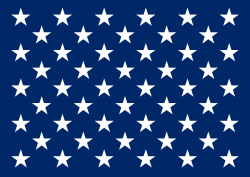Union Jack
English
Noun
Union Jack (plural Union Jacks)

 Flag Ratio: 1:2
Flag Ratio: 1:2- The flag of the United Kingdom, consisting of the flags of England (St. George's Cross), Scotland (St. Andrew's Cross), and Ireland (St. Patrick's Cross) now only used in Northern Ireland combined.
- 20 May 2018, Hadley Freeman in The Guardian, Is Meghan Markle the American the royals have needed all along?
- When the wedding started I found a spot near Windsor Castle’s entrance, where I could watch the ceremony on a big screen. People who line the roads at weddings are, by definition, the most die-hard royalists, and all the usual figures were out in force: the men bellowing and ringing bells in the hope of convincing a passing American TV crew they are an actual town crier; the men in suits made of Union Jacks.
- 20 May 2018, Hadley Freeman in The Guardian, Is Meghan Markle the American the royals have needed all along?
- (by extension) The British Empire.
- 2019, Danny Haiphong, Roberto Sirvent, chapter 3, in American Exceptionalism and American Innocence[1], New York: Skyhorse Publishing, →ISBN, page 81:
- Settlers already fearing the possibility of seeing their 1600, sometimes 1700 percent, profit margins stripped from them by London’s abolitionism saw no other option but to secede from the Union Jack.
- (nautical, British) The flag, consisting of the flags of England, Scotland, and Northern Ireland combined, flown on ships of the government of the United Kingdom.

US Union Jack - (nautical, US) The flag, consisting of the blue star-studded field in the corner of the national ensign, flown at the jackstaff by ships at anchor[1].
Translations
flag of the UK
|
flag of the US (nautical)
|
Usage notes
The Union Jack (also Union flag, union jack) is regarded as the official flag of the United Kingdom, although technically no law to that effect has ever been passed.
References
- ^ US FM 55-501 MARINE CREWMAN’S HANDBOOK; 1 December 1999

